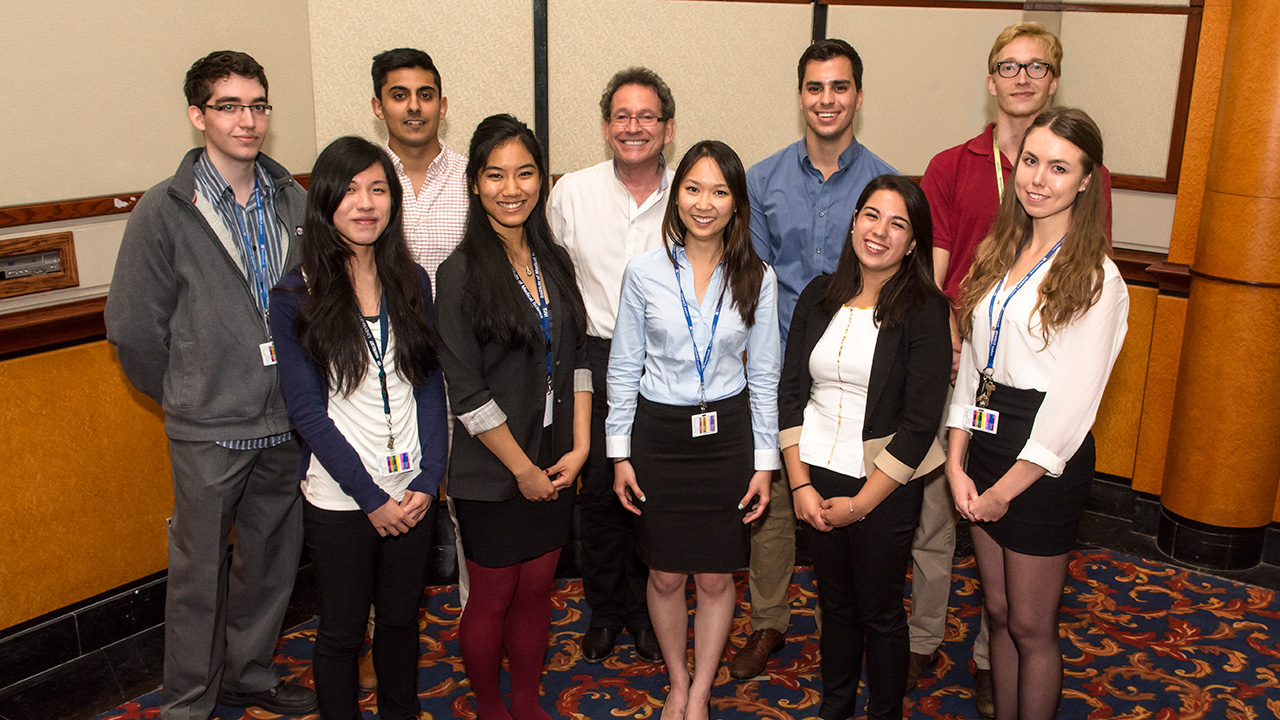Showcasing their potential
By Alisa Kim
While some are bemoaning this summer’s cooler-than-normal temperatures, the heat was on at Sunnybrook Research Institute’s (SRI) Best Summer Research Project competition.
The event capped the D+H SRI Summer Student Research Program, a four-month research-intensive program that allows undergraduates from Canadian universities to learn the fundamentals of scientific inquiry while being mentored by SRI faculty. Students within the program also gain insights into careers in research and attend a weekly seminar series highlighting the work of scientists across the institute’s platforms and programs.
Students presented their research to judges and other passersby checking out the event, which was held August 20, 2014.
“I’m really impressed with the quality of the work I’ve seen,” said Dr. Saeid Amini-Nik, a junior scientist in Biological Sciences and a judge in the competition. “These students have only been here a few months, but [their posters] show they’ve worked really hard. In the short time they’ve had, they’ve made huge accomplishments.”
Judges, comprised of SRI faculty, postdoctoral fellows and graduate students from each platform, listened intently as students provided a “guided tour” through their posters. After outlining their aims, methodology and findings, students answered questions about their work.
There were 55 entrants in this year’s competition—the largest number in recent years—including 16 from Biological Sciences, 19 from Evaluative Clinical Sciences and 20 from Physical Sciences.
Judges selected the top student from each platform, basing their decisions on the quality of the poster, the project’s scientific merit and the student’s ability to present and defend data. There were also second- and third-place winners due to the number of participants.
Prior to announcing the winners, Dr. Michael Julius, vice-president of research at Sunnybrook made a few remarks. “I want to pay homage to D+H. They have made a material gift to SRI, hence enabling our capacity to give more money to more people to help us create you guys, who are our global future,” he said. He then congratulated the students on their efforts.
Ryan Gotesman, who was supervised by Dr. Sandra Black, placed first in Evaluative Clinical Sciences for developing an automatic algorithm to identify enlarged perivascular spaces on magnetic resonance imaging (MRI) scans of patients with Alzheimer’s disease. Gotesman noted these enlarged spaces are of interest to researchers because of their utility as potential biomarkers for cerebral small vessel disease, which is believed to contribute to dementia.
“They’re frequently observed in individuals with Alzheimer’s disease and multiple sclerosis. Increased enlarged perivascular space severity is linked with amyloid angiopathy, high blood pressure and cognitive decline. I worked in tandem with image analysts and radiologists to analyze how they presented themselves on MRI, and to come up with a way of discerning them from other lesions that present themselves in MRI brain scans,” said the second-year McMaster student.
Other award winners (platform; supervisor) include:
First place:
- Olivia Hough (Physical Sciences; Dr. Kullervo Hynynen): “Role of nitric oxide in focused ultrasound-mediated blood-brain barrier opening.”
- Vivian Tia (Biological Sciences; Dr. Juan Carlos Zúñiga-Pflücker): “Construction and functional analysis of delta-like 4-IgM fusion protein: potential to generate T cells in vitro?”
Second place:
- Claudia Dziegielewski (Physical Sciences; Dr. Greg Stanisz): “Using vasculature and cell viability to assess response to radiotherapy in prostate cancer.”
- Chloe Gui (Biological Sciences; Dr. Marc Jeschke): “Post-burn chronic inflammasomes contribute to keloid formation.”
- Shamir Sohail (Evaluative Clinical Sciences; Dr. Andrew Lim): “Disrupted circadian rest-activity rhythms in older adults are associated with adverse metabolic and cardiovascular consequences.”
Third place:
- Thuy Linh Do (Evaluative Clinical Sciences; Dr. Jeff Kwong): “A descriptive analysis of the Ontario SOMNIA study participants.”
- Michael Hynes (Physical Sciences; Dr. Stuart Foster): “Ultrasound hyperthermia treating dry eye disease: in vivo studies.”
- Mathew Nicholas (Biological Sciences; Jeschke): “Manufacturing a novel and inexpensive pullulan-based skin substitute.”
For more on the D+H SRI Summer Student Research Program, including profiles of some of this year's students, visit the education and training section of the website.






